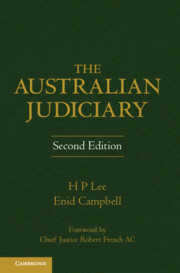Book contents
- Frontmatter
- Contents
- Preface
- Acknowledgments
- Table of Cases
- Table of Statutes
- Chapter 1 Introduction
- Chapter 2 The courts and judges
- Chapter 3 The judiciary as a branch of government
- Chapter 4 Appointment and conditions of service
- Chapter 5 Removal, suspension and discipline of judges
- Chapter 6 Judicial conduct
- Chapter 7 Extra-judicial activities of judges
- Chapter 8 Protecting judicial institutions
- Chapter 9 The accountability of judges
- Chapter 10 A public trust
- Appendix 1 Judicial statistics tables
- Guide to Judicial Conduct
- Index
- References
Chapter 4 - Appointment and conditions of service
Published online by Cambridge University Press: 05 December 2012
- Frontmatter
- Contents
- Preface
- Acknowledgments
- Table of Cases
- Table of Statutes
- Chapter 1 Introduction
- Chapter 2 The courts and judges
- Chapter 3 The judiciary as a branch of government
- Chapter 4 Appointment and conditions of service
- Chapter 5 Removal, suspension and discipline of judges
- Chapter 6 Judicial conduct
- Chapter 7 Extra-judicial activities of judges
- Chapter 8 Protecting judicial institutions
- Chapter 9 The accountability of judges
- Chapter 10 A public trust
- Appendix 1 Judicial statistics tables
- Guide to Judicial Conduct
- Index
- References
Summary
Appointments
The process of appointing judges is an issue of considerable interest in Australia, especially in relation to appointment of judges to the superior courts. The appointment of a new member of the High Court or of the various heads of jurisdictions at both State and federal levels tends to attract publicity of varying magnitude. There is often much speculation about the identity of the likely appointee before the decision is announced and, in the case of High Court appointments, a spectrum of commentary after the announcement about the appointee’s likely impact on the direction of the High Court in constitutional interpretation.
The reason for a special interest in High Court appointments is that judgments of the High Court, particularly in the public law arena, affect the so-called federal balance of the Constitution. The use by the Commonwealth Parliament of the power to make laws in order to achieve Commonwealth objectives over the protestations of the States has caused a number of State governments to chafe at their lack of real input into the appointment of High Court judges. The power of the Commonwealth Parliament to legislate with respect to ‘external affairs’ conferred by s 51(xxix) of the Commonwealth Constitution, and the broad interpretation given to that power in Tasmanian Dams by the High Court, evoked an outpouring of criticism by the advocates of State rights. The development of a jurisprudence of ‘implied rights’ has led to claims by critics of the High Court of a judicial usurpation of legislative powers of the Parliament or a subversion of the amendment process in s 128 of the Constitution. In 1996, in the wake of the decisions of the High Court in Mabo and Wik (which concerned the judicial recognition of some form of indigenous entitlement to land), a number of State Premiers urged a thorough re-vamp of the process of judicial appointment and called for the greater involvement of the States in making such appointments. Calls for reform of the judicial appointment process are generally focused on arguments that society would be better served by a more ‘representative’ judiciary in terms of gender, ethnicity and geographical diversity.
- Type
- Chapter
- Information
- The Australian Judiciary , pp. 84 - 115Publisher: Cambridge University PressPrint publication year: 2012

